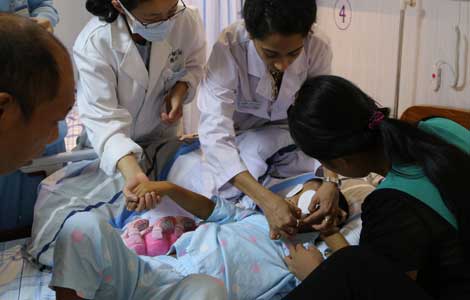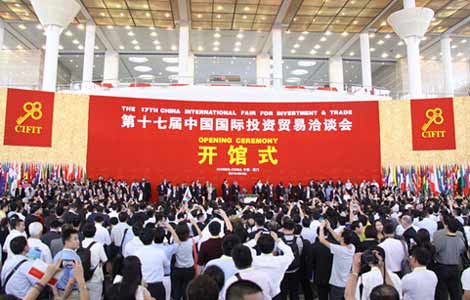August's data signal stronger growth: Analysts
Updated: 2013-09-10 23:50
By Chen Jia (China Daily)
|
||||||||
Stronger industrial output, fixed-asset investment and domestic consumption in August all point to a solid pickup in China's economic growth in the second half, analysts said.
Growth is expected to accelerate further in the coming months, as global demand may continue to strengthen — and that can improve enterprises' profitability and boost their willingness to invest, economists said.
On Tuesday, the National Bureau of Statistics reported the fastest growth for industrial output in 17 months in August.
Production grew 10.4 percent year-on-year compared with 9.7 percent in July and 8.9 percent in June, mainly on the contribution by the manufacturing sector.
The swiftest growth was in the western region of the country, with a rate of 12.9 percent, while it was 11.4 percent in the central region and 9.3 percent in the east.
During the first eight months, fixed-asset investment accelerated to a 20.3 percent gain year-on-year compared with 20.1 percent from January to July.
In August, retail sales rose 13.4 percent year-on-year, up from 13.2 percent in July, reaching the highest level since March, the NBS said.
Export data for August was yet another sign of improvement for the world's second-largest economy. Overseas sales increased 7.2 percent year-on-year, against just 5.1 percent in July.
The overall rebound was in line with robust demand from Asia, especially from the Association of Southeast Asian Nations, and the faster recovery in the United States and European Union.
Louis Kuijs, chief economist in China at the Royal Bank of Scotland Group Plc, said that in addition to the export improvement, domestic demand has become the key to driving up overall growth. He pointed to such areas as robust property construction and infrastructure projects, including railways.
Stronger domestic demand has offset the impact of a firmer monetary stance, Kuijs said. RBS said the stronger figures were signs of a cyclical improvement, which could yield 8.2 percent economic growth in 2014. This year's GDP growth rate is expected to be 7.5 percent.
Qu Hongbin, chief economist in China with HSBC Holdings Plc, said that economic growth bottomed out in the second quarter, when it slowed to 7.5 percent from 7.7 percent in the first three months.
"Growth in the third quarter is likely to be even faster, as investment in both the manufacturing industry and infrastructure are tending to accelerate," Qu said.
On Tuesday, the People's Bank of China reported faster-than-expected growth of new credit and money supply in August. New yuan-denominated loans were 711.3 billion yuan ($115 billion), compared with 703.9 billion yuan a year earlier.
Broad money supply rose 14.7 percent year-on-year, up from 14.5 percent in July, according to the central bank. "The government can keep monetary policy relatively accommodative to ward off any downside risks," said Qu.
Those risks include the currency and market impact of any United States move to taper off its quantitative easing policy.
A much better sign that China can stabilize economic growth in the coming months is that inflation remains tame. The consumer price index rose 2.6 percent year-on-year in August, down from 2.7 percent in July, according to the NBS.
Electricity consumption, which is considered a proxy for industrial production, is expected to pick up at a double-digit rate in August, as the provincial data that have been released all showed expansion.
Zhejiang, a coastal province with many export-oriented manufacturers, reported a 15.2 percent increase of electricity use in August, up from 11.8 percent in July.
Most Viewed
Editor's Picks

|

|

|

|

|

|
Today's Top News
US Senate halts vote on use of force in Syria
Li vows to provide more jobs
IPO to land deals in Hollywood
StanChartered, HSBC 'poised to enter FTZ'
China's data signal stronger growth
Timetable not set for Six-Party Talks
Jobs outlook positive across entire nation
Japan must cease islands provocations, China warns
US Weekly

|

|














